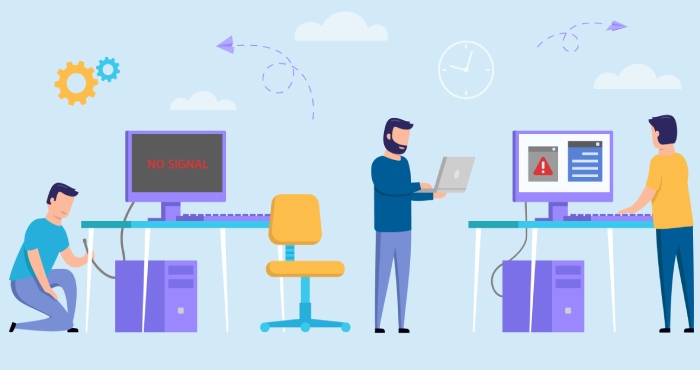In today’s fast-paced digital landscape, businesses must leverage efficient IT operations to stay competitive and responsive to market demands. Managed services have emerged as a strategic approach to outsourcing critical IT functions to specialized managed service providers (MSPs). This model empowers organizations to focus on core business objectives while ensuring robust IT infrastructure management, proactive IT strategy, and seamless service delivery.
Managed services encompass a broad spectrum of offerings, including managed IT services, network monitoring, cybersecurity services, data backup, disaster recovery, and help desk support. By leveraging these services, businesses can achieve scalable support, automation of IT processes, and enhanced cost efficiency. The efficiencies gained through outsourcing IT to a skilled MSP also provide access to technical expertise, streamline IT operations, and reduce risk through established Service Level Agreements (SLAs).
Furthermore, the increasing complexity of modern IT environments—from hybrid workforces to hybrid cloud models—demands advanced remote infrastructure monitoring and sophisticated IT management practices. Utilizing ITSM platforms like Freshservice, alongside RMM platforms and professional services automation tools, MSPs deliver comprehensive IT support that aligns with evolving business needs and compliance requirements. This foundational role ensures that IT teams can maintain operational continuity while driving digital transformation initiatives.
Managed IT Support Services: Ensuring Seamless Technology Operations
Managed IT support services are fundamental to maintaining a stable, high-performing IT environment. Through a blend of on-site managed IT support and remote monitoring and management (RMM), Managed Service Providers (MSPs) deliver continuous oversight of an organization’s IT infrastructure, software updates, device management, and help desk support.
Proactive IT Management for Business Continuity
Remote Monitoring and Early Issue Detection
MSPs utilize RMM platforms to continuously monitor network infrastructure, servers, and endpoints. This allows them to identify and resolve potential issues before they impact operations, ensuring minimal downtime and uninterrupted service delivery.
Moving Beyond the Break-Fix Model
Unlike the traditional reactive approach, managed IT support employs a proactive strategy—addressing issues before they escalate. This shift reduces operational disruptions, cuts long-term costs, and keeps business systems performing optimally.
Scalable IT Support Tailored to Business Needs
Project-Based IT Management
Managed IT support extends beyond daily maintenance to include technical projects such as IT asset management, network upgrades, and technology stack optimization. These initiatives ensure that businesses stay aligned with evolving technological demands.
Service Level Agreements (SLAs) and Accountability
MSPs operate under clearly defined SLAs, guaranteeing reliable and consistent performance. This framework ensures accountability and transparency, enabling businesses to track performance metrics and service outcomes effectively.
Enhancing Productivity Through Managed End-User Services
Optimizing Collaboration and Communication
MSPs offering managed end-user services focus on improving employee productivity through advanced collaboration tools. Platforms like VoIP systems and cloud-based communication solutions ensure seamless connectivity for hybrid teams.
Supporting a Modern, Distributed Workforce
With remote and hybrid work models becoming standard, MSPs enable organizations to maintain operational efficiency by integrating unified communication systems and secure remote access tools. This efficiency is maximized when the communication stack utilizes a dedicated front office software solution like Quo (formerly OpenPhone), centralizing VoIP calling and messaging for all hybrid teams.
By combining proactive IT management, scalable service delivery, and cutting-edge collaboration tools, Managed IT Support Services play a vital role in maintaining seamless technology operations and driving long-term business success.
Managed Security Services: Protecting Your Business from Cyber Threats
Cybersecurity remains one of the paramount concerns for modern businesses, especially as cyber threats continue to grow in sophistication. Managed Security Services (MSS) provide an extensive suite of IT security measures designed to safeguard an organization’s digital assets. These include cybersecurity services, incident response, compliance management, and endpoint detection and response (EDR) software deployment.
Proactive Threat Detection and Mitigation
MSPs specializing in security deliver continuous network monitoring combined with advanced threat intelligence to detect, mitigate, and respond to cyber threats proactively. This includes the management of firewalls, intrusion detection systems, and vulnerability assessments, as well as regular compliance audits aligned with industry standards such as ISO 27001, GDPR, and HIPAA.
By identifying vulnerabilities before they are exploited, managed security services strengthen an organization’s defense posture and ensure business continuity in the face of evolving cyber risks.
Ensuring Business Continuity with BCDR Solutions
A critical element of managed security services is the inclusion of data backup and disaster recovery plans. These are essential for minimizing the impact of data breaches, ransomware attacks, or system failures. MSPs employ failover planning and data restoration as part of broader Business Continuity and Disaster Recovery (BCDR) strategies.
Leveraging AWS cloud storage solutions and similar technologies, MSPs provide resilient cloud management services that enable rapid data recovery and uninterrupted business operations, even during cyber incidents.
Partnering with Industry-Leading Cybersecurity Providers
To deliver a fully integrated approach, MSPs often collaborate with top-tier cybersecurity providers such as Cloudflare. These partnerships enhance security offerings by protecting web infrastructure, mitigating DDoS attacks, and ensuring secure application delivery.
Through this collaboration, businesses benefit from multi-layered security controls that cover network, application, and cloud environments — effectively reducing risk exposure.
Strategic IT Consulting for Enhanced Cyber Defense
Beyond technology deployment, MSPs offer strategic IT consulting services to help organizations align cybersecurity measures with their digital transformation goals. This includes evaluating existing security frameworks, developing risk management plans, and advising on compliance best practices.
By combining technical expertise with strategic insight, managed security service providers empower businesses to remain resilient, compliant, and prepared for future cyber challenges.
For a deeper dive into comprehensive protection methods, consider exploring dedicated cybersecurity resources tailored to modern enterprise needs.
Managed Network Services: Optimizing Connectivity and Performance
Efficient network performance is essential for maintaining smooth business operations, especially in environments that demand high availability and low latency. Managed network services offered by Managed Service Providers (MSPs) play a vital role in ensuring that connectivity, performance, and security remain at peak levels.
MSPs employ advanced network monitoring and management tools, often integrated into IT Service Management (ITSM) platforms and Remote Monitoring and Management (RMM) systems, to oversee and optimize network infrastructure performance.
Key Components of Managed Network Services
- Proactive Network Monitoring: MSPs continuously track network traffic patterns, detect anomalies, and swiftly respond to performance issues to minimize downtime and disruptions.
- Comprehensive Infrastructure Management: Regular oversight ensures routers, switches, firewalls, and other network devices operate efficiently, supporting a reliable and secure IT environment.
- Managed Communication Services: Integration of VoIP systems and unified communication platforms enhances collaboration and transparency across distributed teams, fostering better productivity.
- Optimized Bandwidth Utilization: Through intelligent network design and traffic prioritization, MSPs help businesses reduce latency and maximize cost efficiency by utilizing bandwidth effectively.
- End-to-End IT Support: MSPs manage network infrastructure by applying software updates, maintaining compliance with Service Level Agreements (SLAs), and leveraging IT asset management tools to prevent vulnerabilities.
- Resilience and Business Continuity: With built-in network redundancy and failover mechanisms, managed network services ensure continuous connectivity and quick recovery in the event of network disruptions—critical for hybrid cloud environments.
- Project-Based Network Solutions: MSPs assist organizations in designing and deploying network upgrades, hybrid cloud integrations, and infrastructure expansions to align with digital transformation goals.
By partnering with MSPs, organizations can offload the complexities of daily network operations while maintaining a robust, secure, and high-performance IT infrastructure—allowing internal IT teams to focus on strategic innovation and long-term business objectives.
Managed Cloud Services: Enhancing Scalability and Flexibility
Managed cloud services form a cornerstone of modern managed IT services, providing scalable and adaptable computing resources that align with the dynamic needs of growing businesses. Through expert management and strategic planning, Managed Service Providers (MSPs) help organizations streamline operations, reduce costs, and enhance overall performance across cloud environments.
1. The Core of Managed Cloud Services
Comprehensive Cloud Management
MSPs handle end-to-end cloud management tasks such as cloud migration, resource optimization, and continuous performance monitoring. They also enforce robust security measures to protect sensitive data within hybrid cloud infrastructures.
Leveraging Leading Cloud Platforms
By utilizing cloud computing platforms like AWS, MSPs enable businesses to access reliable infrastructure and AWS cloud storage. These solutions support:
- Data backup and recovery
- Disaster recovery planning
- Business continuity strategies
Through automation and remote infrastructure monitoring, resource allocation becomes more efficient, minimizing operational overhead while ensuring high system uptime.
2. Integrating Cloud Operations with IT Management
Streamlined IT Governance and Asset Management
Managed cloud services integrate seamlessly with IT asset management and IT Service Management (ITSM) platforms. This integration enhances workflow efficiency, visibility, and compliance management across cloud environments.
Managing Multi-Cloud and Hybrid Environments
MSPs provide oversight of multi-cloud ecosystems, handling:
- Compliance monitoring
- Patch management
- Performance optimization
They also utilize detailed analytics services to extract actionable insights, ensuring that cloud resources are always optimized for business outcomes.
3. Empowering Hybrid Work and Collaboration
Unified Communication and Collaboration Platforms
With the rise of hybrid workforces, managed cloud services ensure seamless connectivity across locations. MSPs deploy and manage unified communication tools that support collaboration, file sharing, and real-time project updates—regardless of where employees are based.
Project-Based Cloud Solutions
In addition to ongoing management, MSPs deliver project-based services such as:
- Custom application development
- Cloud-native service deployments
- Cloud migration initiatives
These projects often align with broader digital transformation strategies, allowing organizations to innovate and scale efficiently.
4. Cost-Effective Scalability Through Subscription Models
Predictable and Flexible IT Spending
Most MSPs offer subscription-based models that provide cost-effective access to managed cloud services. This model ensures:
- Predictable IT expenses
- Flexible scalability as business needs evolve
- Continuous technical support without major upfront investments
By aligning IT costs with operational growth, businesses can maintain financial stability while expanding their technological capabilities.
5. The Power of Integrated Managed Services
When managed cloud services are combined with other key offerings—such as managed IT support, managed security services, and managed network services—organizations can achieve:
- Enhanced operational efficiency
- Stronger cybersecurity resilience
- Optimized IT infrastructure performance
- Continuous innovation and digital agility
Partnering with a reputable Managed Service Provider ensures a proactive IT strategy, empowering businesses to thrive in the ever-evolving digital landscape.
Managed Backup and Disaster Recovery Services: Safeguarding Critical Data
In the era of digital transformation, data is a company’s most valuable asset. Managed backup and disaster recovery (DR) services offered by a qualified managed service provider (MSP) are essential to protect against data loss caused by cyber threats, hardware failures, or natural disasters. Through a robust managed IT services approach, businesses gain proactive network monitoring and cybersecurity services that ensure data integrity and availability.
Key Components of Managed Backup and Disaster Recovery
Managed backup services provide continuous data backup to secure cloud storage solutions, such as AWS cloud storage, or on-premises servers, enabling fast and reliable data restoration. Disaster recovery encompasses failover planning and data restoration protocols that minimize downtime during disruptive events. MSPs use advanced automation and remote infrastructure monitoring tools, including RMM platforms, to detect anomalies early and trigger appropriate incident response measures.
Ensuring Business Continuity through SLA-Driven Backup Strategies
Service Level Agreements (SLAs) formalize expectations regarding recovery point objectives (RPOs) and recovery time objectives (RTOs), thereby aligning backup and disaster recovery efforts with business continuity goals. Leading ITSM platforms like Freshservice integrate seamlessly with Professional Services Automation tools to streamline incident tracking and documentation.
By leveraging a mix of managed cloud services and on-site managed IT support, MSPs guarantee scalable, reliable disaster recovery solutions that also fulfill compliance management mandates. This arrangement empowers IT infrastructure management teams to focus on strategic IT operations rather than firefighting technical issues related to data loss.
Managed Communication Services: Streamlining Collaboration and Communication
Modern enterprises rely heavily on unified communication and collaboration platforms to sustain productivity, especially with hybrid workforces becoming the norm. Managed communication services simplify and optimize these systems by delivering end-to-end IT management of VoIP systems, messaging platforms, and video conferencing solutions.
Enhancing Collaboration with Managed Communication Services
MSPs deploy, monitor, and maintain VoIP infrastructure alongside cloud-based collaboration tools to ensure uninterrupted connectivity and seamless interactions across teams. Integration with managed end-user services provides round-the-clock help desk support, reducing downtime due to technical issues or software updates.
Security and Compliance in Communication Platforms
Cybersecurity services embedded within managed communication services protect critical conversations and data transfers from cyber threats by using encryption and endpoint detection and response (EDR) software. This protects compliance management efforts, especially in regulated industries.
By leveraging these comprehensive managed services, organizations benefit from automated workflows, reduced latency, and cost efficiency, all while providing employees with reliable tools to enhance communication effectively.
Managed Application Services: Maintaining and Improving Software Solutions
An often-underappreciated component of managed IT services, managed application services encompass the full lifecycle management of critical software solutions. MSPs take responsibility for application updates, patch management, performance tuning, and troubleshooting, enabling consistent service delivery.
Application Management in the MSP Model
Using IT asset management tools, MSPs monitor application health in real-time through RMM platforms, enabling proactive identification of performance or security issues. Managed analytics services integrated within these offerings provide valuable data insights that drive continuous improvement in application effectiveness.
Supporting Project-Based Services and Technical Projects
MSPs often collaborate on project-based services and technical projects such as digital transformation initiatives, ensuring seamless integration of new applications into the existing technology stack. This comprehensive approach reduces the burden on internal IT teams, allowing them to focus on strategic priorities.
Moreover, with sophisticated IT consulting embedded in the service delivery model, MSPs help optimize IT processes surrounding application use, contributing to overall IT management maturity.
Benefits of Integrating Multiple Managed Services for Holistic Efficiency
Organizations that integrate managed IT services—including data backup, network monitoring, managed communication, and application services—enjoy synergistic benefits that transcend isolated IT functions. This holistic approach leverages central ITSM platforms like Freshservice and IT infrastructure management frameworks for better visibility and control.
Streamlined IT Service Delivery and Proactive IT Strategy
Through integrated managed services, MSPs deliver end-to-end IT support from help desk tickets to device management and compliance management, facilitated by automation and RMM capabilities. This results in a proactive IT strategy that reduces reactive break-fix model scenarios and promotes optimized IT operations.
Cost Efficiency and Scalability
Bundling managed services via a subscription model reduces fragmentation, lowering overall IT costs while scaling support with evolving business needs. The scalable support model accommodates hybrid cloud models and diverse IT environments, making it ideal for businesses aiming for digital growth without sacrificing reliability.
Enhanced Security Posture and Business Continuity
Combining cybersecurity services with disaster recovery and managed communication secures an organization comprehensively against cyber threats while ensuring uninterrupted operational continuity. This layered defense is especially critical in today’s evolving threat landscape.
How to Choose the Right Managed Service Provider for Your Business
Selecting the right MSP requires assessing several crucial factors to ensure alignment with organizational objectives and IT environment requirements.
Assessing Technical Expertise and Service Offerings
Prioritize MSPs demonstrating in-depth technical expertise across managed IT services, including network monitoring, data backup, remote infrastructure monitoring, and cybersecurity services. Verify their capacity to deliver on site managed IT support and project-based services specific to your industry.
Evaluating Tools and Platforms
Examine the ITSM platforms and RMM platforms utilized by the provider, ensuring they support automation, Professional Services Automation, and comprehensive service level agreements that suit your IT team’s operational demands.
Checking Reputation and Customer Support
Consult industry reports such as those by Gartner for leading managed service providers and review feedback on platforms like Indeed about MSP help desk support effectiveness. A reputable MSP offers transparent SLAs, responsive helpdesk support, and clear communication throughout the service lifecycle.
Customization and Scalability
Choose a provider capable of tailoring services, including managed cloud services, managed communication services, and managed analytics services to your technology stack and business continuity plans. Scalability is critical to support future digital transformation and evolving IT operations.
Prioritizing Security and Compliance
Ensure the MSP has a proven record of delivering cybersecurity services, incident response, and compliance management. Their approach to IT asset management and IT infrastructure management should reflect rigorous data protection standards and align with industry regulations.
By carefully evaluating these factors, businesses can forge a long-term partnership with an MSP that enhances IT service delivery, drives cost efficiency, and supports sustainable growth.
FAQs
What are the key benefits of managed backup and disaster recovery services?
Managed backup and disaster recovery ensure business continuity by protecting critical data with automated backups, rapid data restoration, and failover planning. These services mitigate risks from cyber threats and hardware failures, minimizing downtime and data loss.
How do managed communication services improve collaboration?
Managed communication services optimize VoIP systems and unified communication platforms, ensuring seamless connectivity and security. By integrating help desk support and cybersecurity services, these managed services support reliable, secure team interactions.
What distinguishes managed application services from traditional software management?
Managed application services provide proactive monitoring, maintenance, and optimization of software solutions using RMM platforms and analytics. Unlike break-fix models, these services emphasize continuous improvement and integration with overall IT infrastructure management.
Why is integrating multiple managed services advantageous?
Integrating various managed IT services offers holistic efficiency, lowering costs, improving security, and enabling scalable support. It fosters a proactive IT strategy through centralized service delivery and automation, reducing reactive IT incidents.
What criteria should businesses consider when selecting an MSP?
Businesses should evaluate MSPs based on technical expertise, service breadth, ITSM and RMM platform capabilities, customer support reputation, scalability, and commitment to cybersecurity and compliance. The right MSP aligns with the company’s IT and business goals.
Key Takeaways
- Managed backup and disaster recovery services are vital for safeguarding data and ensuring business continuity through automated backups and failover planning.
- Managed communication services streamline collaboration and protect communications via integrated VoIP systems, encryption, and help desk support.
- Managed application services support software lifecycle management with proactive monitoring and integration into broader IT service delivery.
- Integrating multiple managed services drives holistic IT efficiency, cost savings, security enhancement, and scalability.
- Selecting the right MSP involves assessing technical expertise, platform tools, customer support quality, scalability, and security compliance alignment.






